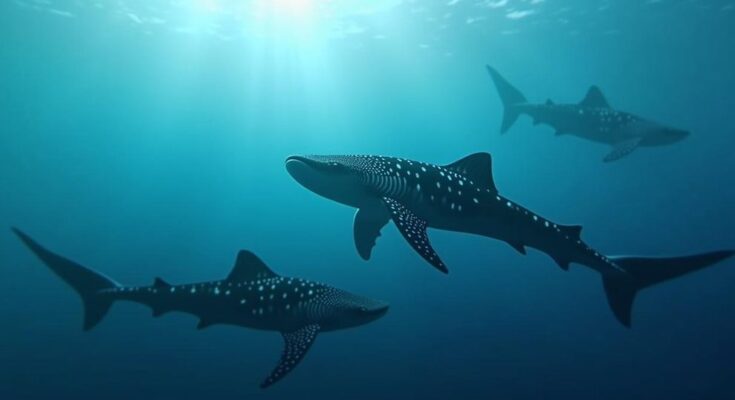A new study reveals that endangered whale sharks are at increased risk of collisions with large ships due to climate change, which is shifting their habitats into busy shipping lanes. The research warns that interactions could rise dramatically by the century’s end, highlighting the importance of mitigating global warming to protect these vulnerable species.
Recent research indicates that endangered whale sharks are increasingly at risk of dangerous shipping collisions due to the impacts of climate change. As the largest fish species, capable of reaching lengths over 60 feet, whale sharks are predicted to be displaced into new habitats that intersect with busy shipping lanes as ocean temperatures rise. Conducted by scientists from the University of Southampton and the Marine Biological Association, this study suggests that the interactions between whale sharks and large vessels could increase up to 15,000 times by the century’s end under high emission scenarios. The study featured in the journal “Nature Climate Change” underscores the potential for severe habitat losses, particularly in Asia, where models anticipate over 50% reduction in certain national waters by 2100 if current emissions trends continue. The research highlights the whale sharks’ adaptability to temperature changes, yet emphasizes their vulnerability to ship strikes. Using satellite tracking data in conjunction with climate models, scientists examined whale shark distribution under three future climate scenarios. Their findings illustrate that while some regions may witness an increase in core habitat, particularly in Europe under sustainable development strategies, the overall trend indicates a higher likelihood of encounters with shipping traffic, raising significant concerns for species management and conservation efforts. Experts advocate for the urgent need to address climate change to mitigate these risks and protect vulnerable marine life.
Climate change presents a variety of challenges for marine species, particularly for the endangered whale shark, which is increasingly at risk from human activities such as maritime shipping. As ocean temperatures rise, these creatures are likely to be forced into new habitats where they may encounter busy shipping lanes more frequently. This study provides crucial insights into how global warming will affect marine biodiversity, as well as the key interactions between marine life and increased human activity. The importance of understanding these dynamics is essential for conservation strategies and effective management practices.
In summary, the research conducted by the University of Southampton and the Marine Biological Association highlights the urgent need to confront climate change, as it significantly influences the migratory patterns and habitat suitability of endangered whale sharks. The expected rise in interactions with large vessels under various climate scenarios poses an imminent threat to their survival, underscoring the necessity of incorporating climate considerations into conservation efforts worldwide. Immediate actions to mitigate emissions can potentially alleviate extreme impacts on marine biodiversity and promote healthier ecosystems.
Original Source: www.thetimes-tribune.com




